Helen Jensen, Intern 2005-2006
Background Bio:
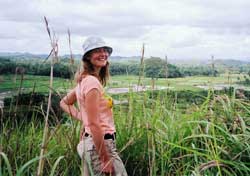 I grew up in the Eastern Townships region of Québec on a small
farm where I knew all the goats by name. I developed a love of plants
and everything that grows at a young age and spent three years working
on organic farms in the region. Later, I spent two years planting trees
and feeding blackflies in northern Ontario. During my university studies
I did research on plant chemistry and natural insecticides from tropical
plants and was continuously amazed at the versatility of the plant
world. In the future, I would like to be involved in the development
and implementation of agro-ecological alternatives to conventional
agriculture.
I grew up in the Eastern Townships region of Québec on a small
farm where I knew all the goats by name. I developed a love of plants
and everything that grows at a young age and spent three years working
on organic farms in the region. Later, I spent two years planting trees
and feeding blackflies in northern Ontario. During my university studies
I did research on plant chemistry and natural insecticides from tropical
plants and was continuously amazed at the versatility of the plant
world. In the future, I would like to be involved in the development
and implementation of agro-ecological alternatives to conventional
agriculture.
Education:
M.Sc. Chemical Ecology, University of OttawaB.Sc. Biology, University of Ottawa
Host Country:
The PhilippinesInternship Experience:
Descriptions of the past 6 months tend to emerge as a chaos of images, smells, sounds and feelings. The multi-island nature of the Philippines makes each new project area feel like a completely different world, from stately Luzon to the motherly Visayas. I was lucky to visit and work in several different communities including Los Banos, Luzon and the islands of Panay, Guimaras and Negros, in the Visayas. I became involved in developing and adapting alternative farming systems to the conditions in the project areas. My work in the Philippines had to do with preparations, concoctions and extractions, a theme from my previous work in chemical ecology that seems to keep drawing me back.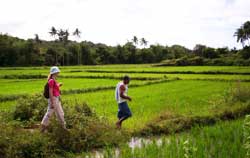 During my internship I was particularly intrigued by the Nature
Farming concoctions that farmers were learning to use and adapt to
restore soil fertility in areas where the intensive use of agrochemicals
had caused severe declines in soil organic matter and crop yields.
The farmers collect indigenous microorganisms from uncultivated areas
and use them to help make preparations from locally available materials
such as mudpress, rice bran, kohol snails and manure. The use of
a fermented preparation known as bokashi for fertilizing crops led
to increased crop yields and richer soil. Other preparations were
used to help stimulate the flowering and fruiting stages of plants
and for pest control. I prepared an instruction manual of the Nature
Farming preparations as they are used in the Visayas. This manual
is now being used in farmer training sessions conducted by PABINHI
members and will be used in training government officials in outreach
areas. The ingenuity of the farmers in creating these preparations
was impressive and is one example of their ability to adapt available
resources to suit their needs.
During my internship I was particularly intrigued by the Nature
Farming concoctions that farmers were learning to use and adapt to
restore soil fertility in areas where the intensive use of agrochemicals
had caused severe declines in soil organic matter and crop yields.
The farmers collect indigenous microorganisms from uncultivated areas
and use them to help make preparations from locally available materials
such as mudpress, rice bran, kohol snails and manure. The use of
a fermented preparation known as bokashi for fertilizing crops led
to increased crop yields and richer soil. Other preparations were
used to help stimulate the flowering and fruiting stages of plants
and for pest control. I prepared an instruction manual of the Nature
Farming preparations as they are used in the Visayas. This manual
is now being used in farmer training sessions conducted by PABINHI
members and will be used in training government officials in outreach
areas. The ingenuity of the farmers in creating these preparations
was impressive and is one example of their ability to adapt available
resources to suit their needs.
Another approach to restoring soil fertility and, in a more general way, restore balance to the farm, is to use biodynamic farming techniques. My role in this project was to look for new ways to adapt the biodynamic preparations (originally made with Northern European plants and materials) to the extremely different resource base in the Philippines. Along with farmer leaders and members of the local community I conducted tests to determine the best method for extracting high purity silica from rice hulls for use as an alternative to ground quartz powder in the horn silica preparation. Another set of experiments involved the use of native medicinal plants as natural botanical insecticides to control pests in the vegetable crops.
These projects that emphasize the use of locally available and non-toxic ingredients are important tools in the organic farming revolution in the Philippines. With organic production, farmers can contribute to the overall health of their community by reducing the amount of external inputs in the system and also by spending less money purchasing fertilizers and pesticides. The communal nature of bokashi preparation also helps perpetuate the tradition of neighbours and friends working together to accomplish tasks on each other’s farms.
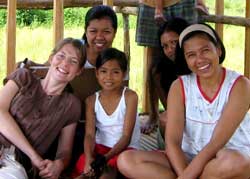 I was amazed to discover the beauty and warmth of the rural Pilipino
culture, with their heartfelt singing, upbeat nature and concern
for everyone around them. I am thankful to all of the people I met
for being so open to sharing their daily lives, from planting the
rice and feeding the chickens to dancing at the annual baranguay
disco-disco. The quiet, sweltering, mid-afternoon hours spent in
a bamboo house playing dama, chatting and just hanging out are something
I will always look back on with smiles.
I was amazed to discover the beauty and warmth of the rural Pilipino
culture, with their heartfelt singing, upbeat nature and concern
for everyone around them. I am thankful to all of the people I met
for being so open to sharing their daily lives, from planting the
rice and feeding the chickens to dancing at the annual baranguay
disco-disco. The quiet, sweltering, mid-afternoon hours spent in
a bamboo house playing dama, chatting and just hanging out are something
I will always look back on with smiles.
Christina Rehbein, Intern 2005-2006
Background Bio:
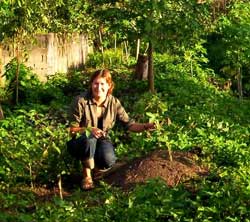 Growing up in the Ottawa Valley, I developed a love of nature and
a strong environmental ethic as a child. I went on to do an Environmental
Science degree at Queen’s University, focusing on earth systems
science and physical geography. I followed this up with a master’s
degree from the University of Waterloo, where I designed a wetland
restoration plan for marginal farmlands combining alternative crops
with wildlife habitat. It was great to work with farmers in British
Columbia on that project. I have also worked as a lab assistant for
Geological Survey, an engineering assistant, a writer, and most recently
as coordinator and editor for the Parks Research Forum of Ontario.
Growing up in the Ottawa Valley, I developed a love of nature and
a strong environmental ethic as a child. I went on to do an Environmental
Science degree at Queen’s University, focusing on earth systems
science and physical geography. I followed this up with a master’s
degree from the University of Waterloo, where I designed a wetland
restoration plan for marginal farmlands combining alternative crops
with wildlife habitat. It was great to work with farmers in British
Columbia on that project. I have also worked as a lab assistant for
Geological Survey, an engineering assistant, a writer, and most recently
as coordinator and editor for the Parks Research Forum of Ontario.
Education:
BSc from Queen’s University, Environmental Science/Earth Systems ScienceMES from University of Waterloo, Environment and Resource Studies
Host Country:
The PhilippinesInternship Experience:
My main responsibility in the Philippines was to develop a project with very exciting possibilities for both aiding local farmers’ livelihoods and the environment, on a local and global scale. This was based on putting some of REAP’s technology and experience in low-impact farming to work in the Clean Development Mechanism (CDM) program developed by the UNFCCC for supporting the Kyoto Protocol.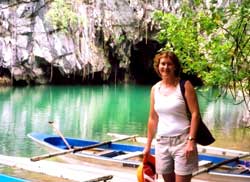 The first CDM-based project involved the Mayon Turbo Stove, which
is capable of displacing approximately two tonnes of fuelwood or
its equivalent in charcoal or LPG per household. This capability
is much needed in provinces such as Iloilo, where the patches of
remaining forests are receding higher and higher up the hills leaving
such a stark landscape below! To initiate the project and submit
a valid proposal, I visited and discussed the potential development
of a rice-hull stove program with many people: welders, an engineer,
an appropriate technology researcher, local government agencies,
and farmers’ cooperatives. I also conducted surveys of rice
mills in Iloilo province in order to estimate the amount of rice
hull available in the Visayan region of the Philippines and to
assess the feasibility of collecting rice hull from the mills as
fuel.
The first CDM-based project involved the Mayon Turbo Stove, which
is capable of displacing approximately two tonnes of fuelwood or
its equivalent in charcoal or LPG per household. This capability
is much needed in provinces such as Iloilo, where the patches of
remaining forests are receding higher and higher up the hills leaving
such a stark landscape below! To initiate the project and submit
a valid proposal, I visited and discussed the potential development
of a rice-hull stove program with many people: welders, an engineer,
an appropriate technology researcher, local government agencies,
and farmers’ cooperatives. I also conducted surveys of rice
mills in Iloilo province in order to estimate the amount of rice
hull available in the Visayan region of the Philippines and to
assess the feasibility of collecting rice hull from the mills as
fuel.
As a second project, I began research on greenhouse gas mitigation through organic rice production with the help of local farmers as well as scientists at the University of the Philippines, the International Rice Research Institute (IRRI) and the Asia Rice Foundation. I collected on-farm data including soil samples, compared these with current literature and experiments, and wrote up the results of this study as a preliminary project idea. This pilot project would involve promoting ecological agriculture as a means to reduce greenhouse gas emissions coming from conventional farming practices (crop residue burning, heavy synthetic fertilizer application, stockpiling of crop residues).
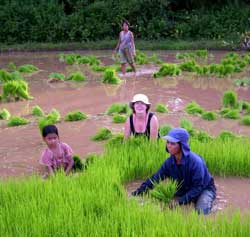 In addition to this work, I also supported the work of our partner
NGO, PABINHI-Pilipinas, in continuing the Philippines Sustainable
Seed and Agriculture project. Through this project, low-income
farmers were realizing greater yields on their organic farms and
developing confidence to experiment with new techniques in sustainable
agriculture that were locally adapted. Helen and I spent two weeks
together studying the local dialect of Guimaras and Panay, Illongo,
in the shade of a mango tree, surrounded by chickens, goats – and
ants. We then separated for our integration period. I moved to
a community in the beautiful north of Guimaras to fumble through
my Illonggo and build trust and understanding by living farm life
there. Seeing me bumbling along in the rice paddies, riding the
carabao, and scrubbing my Canadian undergarments at the well amused
them to no end! But, from what I could grasp of the workers’ talk
with my newly acquired Illonggo, planting rice alongside the workers
and sharing their food and lifestyle was able to foster the kind
of relationships that are invaluable to an international project
effort.
In addition to this work, I also supported the work of our partner
NGO, PABINHI-Pilipinas, in continuing the Philippines Sustainable
Seed and Agriculture project. Through this project, low-income
farmers were realizing greater yields on their organic farms and
developing confidence to experiment with new techniques in sustainable
agriculture that were locally adapted. Helen and I spent two weeks
together studying the local dialect of Guimaras and Panay, Illongo,
in the shade of a mango tree, surrounded by chickens, goats – and
ants. We then separated for our integration period. I moved to
a community in the beautiful north of Guimaras to fumble through
my Illonggo and build trust and understanding by living farm life
there. Seeing me bumbling along in the rice paddies, riding the
carabao, and scrubbing my Canadian undergarments at the well amused
them to no end! But, from what I could grasp of the workers’ talk
with my newly acquired Illonggo, planting rice alongside the workers
and sharing their food and lifestyle was able to foster the kind
of relationships that are invaluable to an international project
effort.
Working in the Philippines proved an incredible experience, engaging me in a more developed leadership role than I would have been exposed to in Canada. The Philippines is a unique country with some special challenges (population pressure, the distinctness of each of its islands!) and it was inspiring for me to work on projects that can help in protecting the incredible biodiversity of the country.




